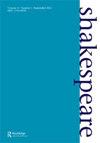莎士比亚的《无事生非》(罗伯特·海斯蒂执导,《月球斜坡》),2022年9月20日,谢菲尔德剧院
IF 0.2
3区 文学
0 LITERATURE, BRITISH ISLES
引用次数: 0
摘要
今年轮到谢菲尔德剧院领导一年一度的“月球斜坡”演出。《月球上的斜坡》是由来自英国各地的七家顶级剧院和场馆合作举办的,它们每年轮流举办演出。这个项目背后的目标是“丰富故事和讲述故事的方式,让舞台内外的聋哑人、残疾人和神经多样性的人都能正常地出现,”导演罗伯特·黑斯蒂在他的节目说明中说。谢菲尔德剧院选择演出莎士比亚的《无事生非》,这部戏剧目前似乎正处于一个特别突出的时刻,国家剧院和环球剧院都在同一场演出中演出,英国皇家莎士比亚剧团也在今年早些时候演出。该剧在五十周年之际登上了坩埚剧院的舞台。戏剧开场时,演员们介绍了他们角色的名字,并详细介绍了他们的服装,这些演员包括聋人、神经多样性、残疾人和非残疾人。他们的开场白中穿插着笑话,本尼迪克宣布他穿着蓝色西装,运动鞋,“肩膀上有一块碎片”。这部戏是由英国手语、手语支持英语、视觉故事和物理戏剧的结合组成的,所以每个角色也介绍了他们将使用的技巧,因为每个演员在这方面都有所不同。虽然一开始这么多的信息似乎让人难以承受,但随着剧情的发展,人们很快就放松了下来,故事的传达方式也变得更加清晰。角色往往是成对出现的,即一个演员在台词上签名,另一个演员同时说台词,交换每个角色的台词,所以几乎任何时候都能覆盖所有的场地。与在舞台周边放置音频描述器或手语翻译不同,无障碍被建立在表演的基础上。此外,舞台的每一边都有数字字幕板。艾米丽本文章由计算机程序翻译,如有差异,请以英文原文为准。
Review of Shakespeare's Much Ado About Nothing (Directed by Robert Hastie for Ramps on the Moon) at the Crucible, Sheffield Theatres, 20 September 2022
This year it was Sheffield Theatres’ turn to lead the annual Ramps on the Moon production. Ramps on the Moon is a collaborative partnership between seven powerhouse theatres and venues from around the UK, who take turns to host productions each year. The goal behind the project is to ‘enrich stories, and the ways in which they are told, by normalising the presence of deaf, disabled and neurodiverse people both on and off stage’, as the director, Robert Hastie, put it in his programme notes. Sheffield Theatres chose to perform Shakespeare’s Much Ado About Nothing, a play that currently seems to be having a moment of particular prominence with the likes of the National Theatre and the Globe both putting on productions during the same run, as well as the RSC earlier in the year. The production took to the stage of the Crucible during its 50th anniversary year. The play opened with the cast, which was a mixture of deaf, neurodiverse, disabled and non-disabled performers, introducing their character’s name and detailing their costume for the benefit of audio description. Their opening lines were interlaced with jokes from the off, with Benedick announcing that he was wearing a blue suit, trainers and ‘a chip on my shoulder’. The play was made up of a combination of British Sign Language, Sign Supported English, visual storytelling and physical theatre so each character also introduced what techniques they would be using as each actor differed in this respect. Although this amount of information seemed overwhelming at first, one soon relaxed as the play began to flow and it became clearer how the story would be communicated. The characters tended to come in pairs whereby one performer signed the lines and the other simultaneously spoke them, swapping for each character’s lines, so all grounds were covered at almost any time. As opposed to having audio describers or sign language interpreters placed at the perimeter of the stage, accessibility was built into the roots of the performance. Additionally, each side of the stage had digital caption boards. Emily
求助全文
通过发布文献求助,成功后即可免费获取论文全文。
去求助
来源期刊

Shakespeare
Multiple-
CiteScore
0.30
自引率
33.30%
发文量
37
期刊介绍:
Shakespeare is a major peer-reviewed journal, publishing articles drawn from the best of current international scholarship on the most recent developments in Shakespearean criticism. Its principal aim is to bridge the gap between the disciplines of Shakespeare in Performance Studies and Shakespeare in English Literature and Language. The journal builds on the existing aim of the British Shakespeare Association, to exploit the synergies between academics and performers of Shakespeare.
 求助内容:
求助内容: 应助结果提醒方式:
应助结果提醒方式:


